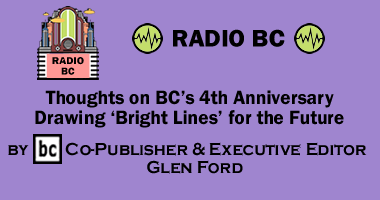
April 6, 2006
Issue 178
4th Anniversary Issue
Radio BC: Thoughts on BC's 4th Anniversary
Drawing ‘Bright Lines' for the Future
Printer Friendly Version
Note: The size of the type may be changed by clicking on view at the top of your browser and selecting "text size". The document will print in the size you select.
Although we would like to throw ourselves a party on this, the week of our fourth anniversary, we at Black Commentator view the occasion as a time for introspection and evaluation. That's what true political people do. We do think there is cause to pop a few corks and cans. We believe even more firmly that when we inaugurated this Internet magazine, four years ago, we were on the right track.
At that time, our analysis was that Black politics was in disarray, for a number of reasons. Two factors seemed central. One, the Black leadership class that assumed the helm after the great civil rights victories had shown itself to be largely out for itself. It was a business oriented class, that expected the Black masses to applaud their every financial or electoral victory - to be satisfied with the presence of Black faces in high places. That's not what generations of our people fought and died for. Rather, they struggled for social and economic justice for all people, in the clear knowledge that only a far more egalitarian society would provide the masses of African Americans any level of justice.
The other menace wreaking havoc in Black politics was the intrusion of rightwing money, deep into the workings of Black community and political institutions. This corrosive, alien presence threatens to subvert and distort African Americans' dialogue among themselves, and with their allies outside the Black community. We would soon not even know where to begin the conversation about our own liberation, or even define the meaning of the word.
In the course of many thousands of hours of wrestling with the issues of the day, to create hundreds of articles in which we stretched the limits of our own analytical cabilities, and with the help of a growing cadre of editors and contributors, The Black Commentator came to an important conclusion: What is most critical to Black America, is that bright political lines be drawn, based on the historical Black consensus on the issues of peace, social and economic justice, human equality, and the right of all peoples to self-determination. No more personality politics. No more celebrity worship. No more deference to the rich among us, most of whom don't give a damn about the rest of us.
The bright lines concept is like a kind of etiquette. You can't have a civil and productive conversation if the people at the table don't know the rules. The rules for African Americans have been traced in centuries of blood: You don't collaborate with the enemy; you don't sell your people, as you were once sold; you don't tolerate wars of aggression, as we were warred upon and enslaved; you don't sacrifice a single human right, for any payment or advantage whatsoever; and you never, never debase the dignity of any other group of human beings.
That is the standard by which we must judge all public policies, legislation and political behavior - bright lines of morality and justice. In this righteous process, we all become informed and conscientious judges of one another - which is as it should be. For Radio BC, I'm Glen Ford.
You can visit the Radio BC page to listen to any of our audio commentaries voiced by BC Co-Publisher and Executive Editor, Glen Ford. We publish the text of the radio commentary each week along with the audio program.
![]()
![]()
Your comments are always welcome.
Visit the Contact Us page to send e-Mail or Feedback
or Click here to send e-Mail to [email protected]
If you send us an e-Mail message we may publish all or part of it, unless you tell us it is not for publication. You may also request that we withhold your name.
Thank you very much for your readership.

